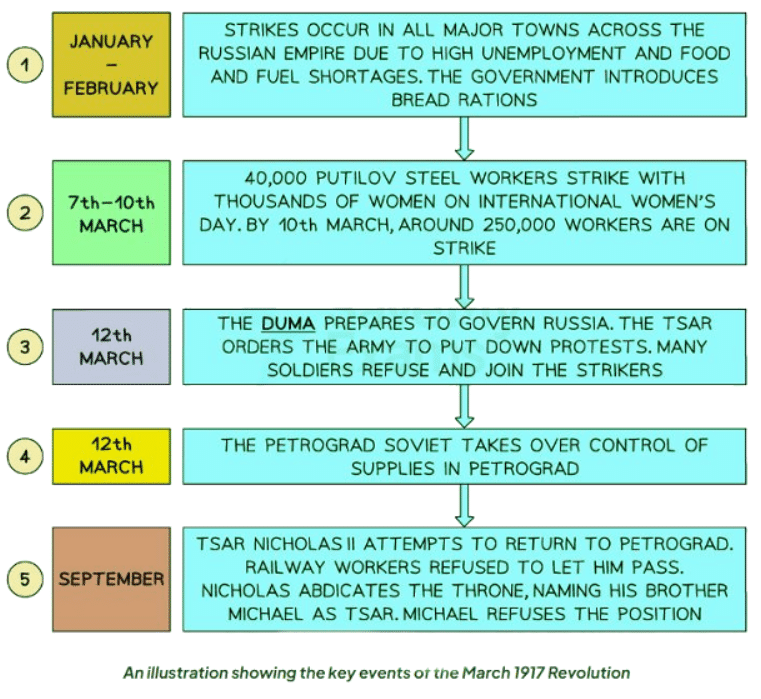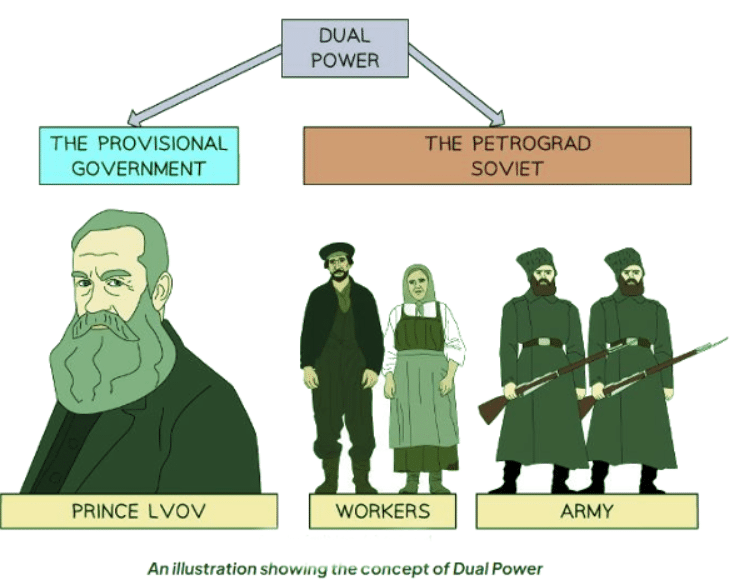Class 10 Exam > Class 10 Notes > History for GCSE/IGCSE > Why was the Revolution of March 1917 Successful?
Why was the Revolution of March 1917 Successful? | History for GCSE/IGCSE - Class 10 PDF Download
| Table of contents |

|
| Was the March Revolution Inevitable? - Summary |

|
| Events of the March 1917 Revolution |

|
| Popular Support |

|
| Military Influence |

|
| Soviet Support |

|
Was the March Revolution Inevitable? - Summary
- Historians debate whether the tsar's abdication in March 1917 was inevitable. A significant factor was the First World War, which created poor conditions in Russia. Food and fuel shortages sparked mass protests in Moscow and Petrograd. With effective governance, these issues might have been solvable. However, Tsar Nicholas' command of the army left Russia leaderless. Tsarina Alexandra and Rasputin ran a chaotic government, frequently changing ministers. Local needs went unmet, and the zemstva took on more responsibility for the health and safety of the Russian people than the government.
- Some historians argue that the First World War only dictated the timing of the March Revolution. They contend that Tsarist Russia had unresolvable issues. The misuse of the army, the empire's economic backwardness, and the mix of nationalities would have eventually caused a revolution. The First World War merely accelerated the timing of this revolution.
Events of the March 1917 Revolution

Popular Support
- The March 1917 Revolution, often termed a 'revolution from below,' was instigated by the workers.
- This uprising garnered widespread backing due to several reasons:
- The turmoil caused by the First World War led to severe shortages of fuel and food, prompting public unrest.
- Russia's significant losses in the war diminished patriotic fervor among the populace.
- The people grew disillusioned with the Tsar's leadership, particularly as the Head of the Army.
- Antipathy towards the Romanovs increased, fueled by the perception of Tsarina Alexandra as the 'German Princess.'
- Industrial workers, becoming less religious, began to question the traditional Divine Rights of Kings.
- A growing boldness to challenge the Tsar's authority emerged as workers turned to Marxist ideologies.
- Alternative governance structures, such as the Duma supported by the middle classes and the Soviets backed by workers and the military, gained traction.
Military Influence
- The Russian Army played a crucial role in supporting Tsar Nicholas II.
- During times of unrest, the Tsar heavily relied on the military to quell uprisings, reminiscent of the events in 1905.
- However, the dynamics changed during the First World War, leading to a shift in the army's allegiance away from the Tsar.
- The soldiers' lack of respect for the Tsar's military decisions weakened his authority.
- Without the military's backing, the Tsar faced a significant loss of power.
- His autocratic rule was sustained by the threat of military force.
- Any succeeding government needed the military's support to govern effectively.
- Many soldiers defected to the Soviets, bolstering the latter's influence within Russia.
Soviet Support
- Following Nicholas' abdication, there arose uncertainty regarding the leadership of Russia as Nicholas' brother declined the throne, marking the conclusion of the 300-year reign of the Romanov dynasty.
- Both the Duma and the Petrograd Soviet vied for authority in the power vacuum created after the March 1917 Revolution, leading to the establishment of a system of Dual Power.

- Both the Provisional Government and the Petrograd Soviet relied on each other. The Provisional Government sought the Petrograd Soviet for their sway over the Army and laborers, while the Petrograd Soviet needed the Provisional Government for their influence on the middle class.
Question for Why was the Revolution of March 1917 Successful?Try yourself: What factors contributed to the public support for the March 1917 Revolution?View Solution
The document Why was the Revolution of March 1917 Successful? | History for GCSE/IGCSE - Class 10 is a part of the Class 10 Course History for GCSE/IGCSE.
All you need of Class 10 at this link: Class 10
|
81 videos|88 docs|18 tests
|
FAQs on Why was the Revolution of March 1917 Successful? - History for GCSE/IGCSE - Class 10
| 1. Was the March Revolution in 1917 inevitable? |  |
Ans. The March Revolution of 1917 was not necessarily inevitable, as it was a result of a combination of factors such as popular support, military influence, and Soviet support, among others.
| 2. What were the key events of the March 1917 Revolution? |  |
Ans. The key events of the March 1917 Revolution included strikes and protests by workers, soldiers refusing to obey orders, the abdication of Tsar Nicholas II, and the establishment of a provisional government.
| 3. How did popular support contribute to the success of the March 1917 Revolution? |  |
Ans. Popular support played a significant role in the success of the March 1917 Revolution by mobilizing workers, peasants, and other groups to demand political change and participate in protests and strikes.
| 4. How did military influence impact the outcome of the March 1917 Revolution? |  |
Ans. Military influence was crucial in the success of the March 1917 Revolution, as soldiers played a key role in refusing to obey orders to suppress protests and ultimately siding with the revolutionaries.
| 5. Why did the Revolution of March 1917 succeed? |  |
Ans. The Revolution of March 1917 succeeded due to a combination of factors including popular discontent, military support, the establishment of a provisional government, and the formation of Soviet councils to represent the interests of workers and soldiers.
Related Searches














